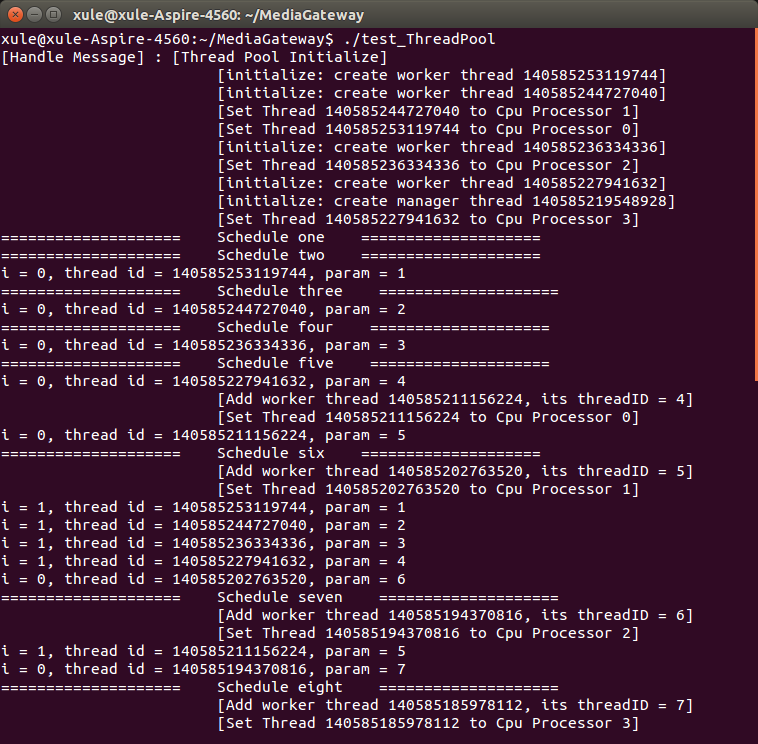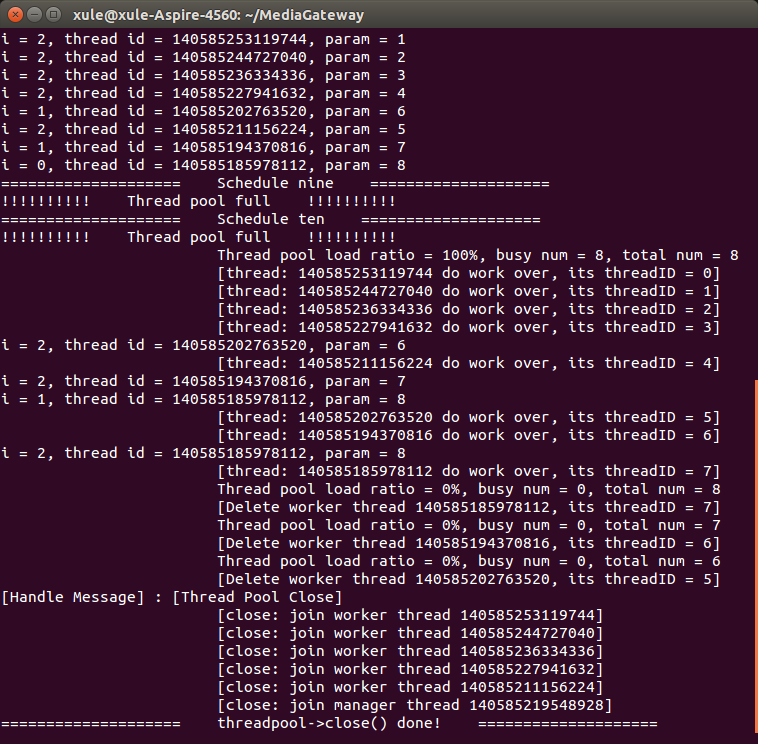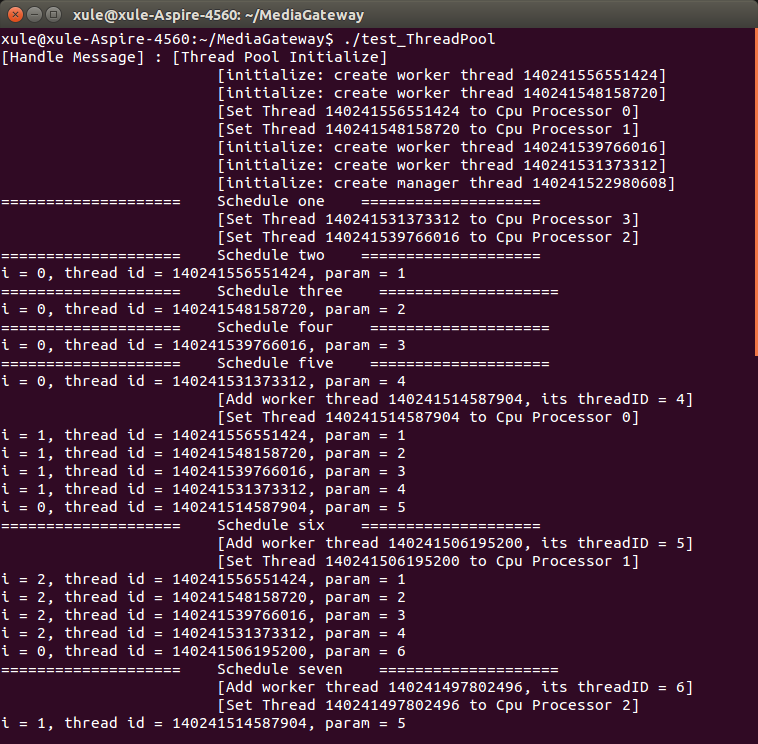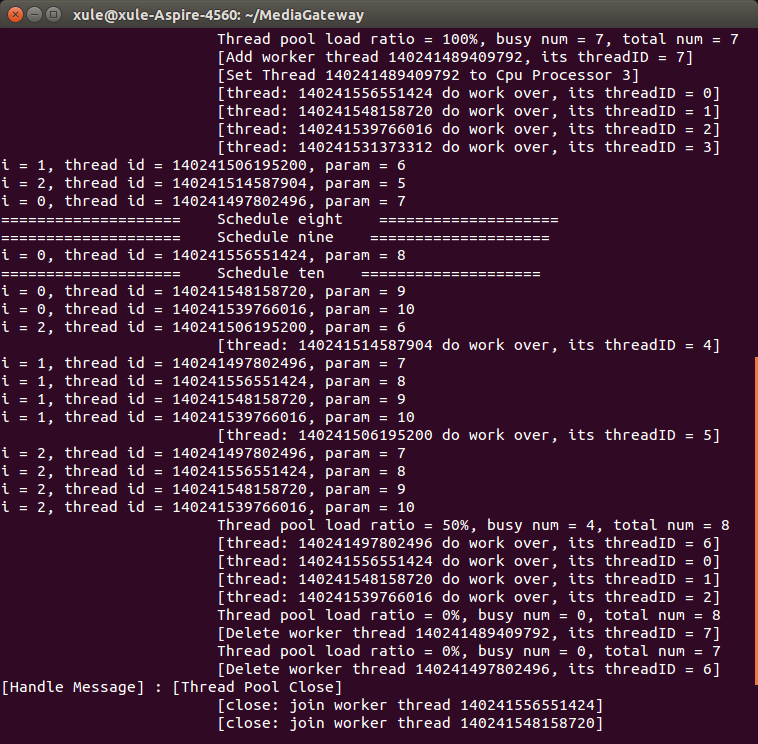本文原创
实现了一个简单的 POSIX 线程池,并且将线程分别绑定到了 CPU 的各个核心上。
抽象类 ThreadPool.hxx:
#ifndef _ThreadPool_HXX
#define _ThreadPool_HXX
#include <stdio.h>
#include <stdlib.h>
#include <sys/types.h>
#include <pthread.h>
#include <signal.h>
#include <unistd.h>
#include <errno.h>
#ifdef __cplusplus
typedef bool TPBOOL;
#define TPTRUE true
#define TPFALSE false
#else
typedef int TPBOOL;
#define TPTRUE 1
#define TPFALSE 0
#endif
#ifndef TPDEBUG
#define TPDEBUG 0
#endif
#if TPDEBUG
#define DBG_OUT(args...) \
do { \
char b__[256]; \
sprintf(b__, args); \
fprintf(stdout, "<%s:%d>\t%s", __FUNCTION__, __LINE__, b__); \
} while(0)
#else
#define DBG_OUT(args...)
#endif
#define BUSY_THRESHOLD 20 // (busy thread)/(all thread threshold)
#define LIMIT_THRESHOLD 80 // (busy thread)/(all thread threshold)
#define MANAGER_INTERVAL 3 // manager thread sleep interval
#define ThreadPool_Status_Normal 0
#define ThreadPool_Status_Idle 1
#define ThreadPool_Status_Busy 2
#define ThreadPool_Status_ReachLimit 3
typedef void* WorkParameter;
typedef void SocketWorkFunction(void *, int);
typedef void DelayTaskWorkFunction(void *);
///////////////////////////////////////
////////// Thread Pool //////////
///////////////////////////////////////
class ThreadPool
{
public:
virtual ~ThreadPool();
virtual TPBOOL initialize();
virtual TPBOOL close();
virtual void processWork(SocketWorkFunction* func, WorkParameter clientData, int mask);
virtual void processWork(DelayTaskWorkFunction* func, WorkParameter clientData);
protected:
ThreadPool(int min_num, int max_num);
virtual TPBOOL AddWorkerThread(TPBOOL isBusy) = 0;
virtual TPBOOL DeleteWorkerThread() = 0;
virtual int GetWorkerThreadIdx(pthread_t id) = 0;
virtual int GetThreadPoolStatus() = 0;
static void HandleThreadQuit(int signo);
static void* OriginalManagerThread(void *clientData);
int minThreadNum; // min thread number in the pool
int curThreadNum; // current thread number in the pool
int maxThreadNum; // max thread number in the pool
pthread_t threadPool_t; // manage thread id num
pthread_mutex_t threadPool_lock;
private:
ThreadPool(const ThreadPool&);
ThreadPool& operator=(const ThreadPool&);
};
#endif
ThreadPool.cxx:
#include "ThreadPool.hxx"
using namespace std;
///////////////////////////////////////
////////// Thread Pool //////////
///////////////////////////////////////
ThreadPool::ThreadPool(int min_num, int max_num) : minThreadNum(min_num), curThreadNum(min_num), maxThreadNum(max_num)
{
}
ThreadPool::~ThreadPool()
{
}
/**
* member function reality. thread pool init function.
* para:
* this: thread pool struct instance pointer
* return:
* true: successful; false: failed
*/
TPBOOL ThreadPool::initialize()
{
}
/**
* member function reality. thread pool entirely close function.
* para:
* this: thread pool struct instance pointer
* return:
*/
TPBOOL ThreadPool::close()
{
}
void ThreadPool::processWork(SocketWorkFunction* func, WorkParameter clientData, int mask)
{
(*func)(clientData, mask);
}
void ThreadPool::processWork(DelayTaskWorkFunction* func, WorkParameter clientData)
{
(*func)(clientData);
}
void ThreadPool::HandleThreadQuit(int signo)
{
DBG_OUT("[Handle sig %d, thread %ld exit]\n", signo, pthread_self());
pthread_exit(NULL);
}
/**
* internal interface. manage thread pool to delete idle thread.
* para:
* pthread: thread pool struct ponter
* return:
*/
void* ThreadPool::OriginalManagerThread(void *clientData)
{
ThreadPool *threadpool = (ThreadPool*)clientData; // main thread pool struct instance
signal(SIGQUIT, HandleThreadQuit);
do {
sleep(MANAGER_INTERVAL);
switch (threadpool->GetThreadPoolStatus())
{
case ThreadPool_Status_Idle:
do {
if (!threadpool->DeleteWorkerThread())
continue;
} while(0);
break;
case ThreadPool_Status_Busy:
break;
case ThreadPool_Status_ReachLimit:
if (threadpool->curThreadNum < threadpool->maxThreadNum)
{
pthread_mutex_lock(&threadpool->threadPool_lock);
TPBOOL res = threadpool->AddWorkerThread(TPFALSE);
pthread_mutex_unlock(&threadpool->threadPool_lock);
}
break;
default:
break;
}
} while(TPTRUE);
}
实现类 BasicThreadPool.hxx:
#ifndef _BasicThreadPool_HXX
#define _BasicThreadPool_HXX
#include "ThreadPool.hxx"
#include <sched.h>
///////////////////////////////////////////////
////////// Basic Worker Thread //////////
///////////////////////////////////////////////
typedef struct {
int threadID;
pthread_t workerThread_t; // thread id num
pthread_cond_t workerThread_cond;
pthread_mutex_t workerThread_lock;
TPBOOL isBusy; // thread status: true-busy; false-idle
TPBOOL isExit;
TPBOOL isWait; // CAUTION:在未调用pthread_cond_wait时通过pthread_cond_signal发送信号会造成信号丢失!
WorkParameter clientData; // void *
SocketWorkFunction* socketWorkFunc; // void (*)(void *, int);
DelayTaskWorkFunction* delayTaskWorkFunc; // void (*)(void *);
int socketMask;
cpu_set_t CPUSet;
} BasicWorkerThread;
/////////////////////////////////////////////
////////// Basic Thread Pool //////////
/////////////////////////////////////////////
class BasicThreadPool : public ThreadPool
{
public:
static BasicThreadPool* createNew(int min_num, int max_num);
virtual ~BasicThreadPool();
virtual TPBOOL initialize();
virtual TPBOOL close();
virtual void processWork(SocketWorkFunction* func, WorkParameter clientData, int mask);
virtual void processWork(DelayTaskWorkFunction* func, WorkParameter clientData);
protected:
BasicThreadPool(int min_num, int max_num);
virtual TPBOOL AddWorkerThread(TPBOOL isBusy);
virtual TPBOOL DeleteWorkerThread();
virtual int GetWorkerThreadIdx(pthread_t id);
virtual int GetThreadPoolStatus();
static void* WorkerHandleThread(void *clientData);
private:
BasicWorkerThread *basicWorkerThreadList; // work thread relative thread info
};
#endif
BasicThreadPool.cxx:
#include "BasicThreadPool.hxx"
using namespace std;
namespace conf {
int CPUCount = sysconf(_SC_NPROCESSORS_CONF);
}
//////////////////////////////////////////
////////// Basic Thread Pool //////////
//////////////////////////////////////////
BasicThreadPool* BasicThreadPool::createNew(int min_num, int max_num)
{
return new BasicThreadPool(min_num, max_num);
}
BasicThreadPool::BasicThreadPool(int min_num, int max_num) : ThreadPool(min_num, max_num)
{
// malloc mem for num thread info struct
basicWorkerThreadList = new BasicWorkerThread[maxThreadNum];
for (int i = 0; i < maxThreadNum; ++i)
basicWorkerThreadList[i].threadID = i;
}
BasicThreadPool::~BasicThreadPool()
{
if (basicWorkerThreadList != NULL)
{
delete[] basicWorkerThreadList;
basicWorkerThreadList = NULL;
}
}
/**
* member function reality. thread pool init function.
* para:
* this: thread pool struct instance ponter
* return:
* true: successful; false: failed
*/
TPBOOL BasicThreadPool::initialize()
{
int i, err;
printf("[Handle Message] : [Thread Pool Initialize]\n");
// create work thread and init work thread info
for (i = 0; i < minThreadNum; ++i)
{
pthread_cond_init(&basicWorkerThreadList[i].workerThread_cond, NULL);
pthread_mutex_init(&basicWorkerThreadList[i].workerThread_lock, NULL);
err = pthread_create(&basicWorkerThreadList[i].workerThread_t, NULL, WorkerHandleThread, &basicWorkerThreadList[i]);
if (err != 0)
{
printf("\t\t\t[initialize: create worker thread failed]\n");
return TPFALSE;
}
printf("\t\t\t[initialize: create worker thread %ld]\n", basicWorkerThreadList[i].workerThread_t);
}
pthread_mutex_init(&threadPool_lock, NULL);
// create manage thread
err = pthread_create(&threadPool_t, NULL, OriginalManagerThread, this);
if (err != 0)
{
printf("\t\t\t[initialize: create manager thread failed]\n");
return TPFALSE;
}
printf("\t\t\t[initialize: create manager thread %ld]\n", threadPool_t);
return TPTRUE;
}
/**
* member function reality. thread pool entirely close function.
* para:
* this: thread pool struct instance ponter
* return:
*/
TPBOOL BasicThreadPool::close()
{
void *status;
printf("[Handle Message] : [Thread Pool Close]\n");
// close work thread
for (int i = 0; i < curThreadNum; ++i)
{
if (pthread_kill(basicWorkerThreadList[i].workerThread_t, 0) != ESRCH) // ESRCH: thread isn't exists
{
pthread_kill(basicWorkerThreadList[i].workerThread_t, SIGQUIT);
pthread_join(basicWorkerThreadList[i].workerThread_t, &status);
pthread_mutex_destroy(&basicWorkerThreadList[i].workerThread_lock);
pthread_cond_destroy(&basicWorkerThreadList[i].workerThread_cond);
printf("\t\t\t[close: join worker thread %ld]\n", basicWorkerThreadList[i].workerThread_t);
}
}
// close manage thread
if (pthread_kill(threadPool_t, 0) != ESRCH)
{
pthread_kill(threadPool_t, SIGQUIT);
pthread_join(threadPool_t, &status);
pthread_mutex_destroy(&threadPool_lock);
printf("\t\t\t[close: join manager thread %ld]\n", threadPool_t);
}
}
// sleep 10 us to ensure when pthread_cond_signal() executes, worker thread is waiting at pthread_cond_wait()
#define CHECK_IS_WAIT_FOR_COND_SIGNAL(idx) \
while (!basicWorkerThreadList[idx].isWait) \
{ \
pthread_mutex_lock(&basicWorkerThreadList[idx].workerThread_lock); \
usleep(10); \
pthread_mutex_unlock(&basicWorkerThreadList[idx].workerThread_lock); \
} \
usleep(10); \
pthread_cond_signal(&basicWorkerThreadList[idx].workerThread_cond);
/**
* member function reality. main interface opened.
* after getting own worker and job, user may use the function to process the task.
* para:
* this: thread pool struct instance ponter
* worker: user task reality.
* job: user task para
* return:
*/
void BasicThreadPool::processWork(SocketWorkFunction* func, WorkParameter clientData, int mask)
{
int i, tmpid;
TPBOOL res;
// fill this->basicWorkerThreadList's relative work key
for (i = 0; i < curThreadNum; i++)
{
pthread_mutex_lock(&basicWorkerThreadList[i].workerThread_lock);
if (basicWorkerThreadList[i].isBusy == TPFALSE)
{
DBG_OUT("processWork: thread %d idle, thread id %ld\n", i, basicWorkerThreadList[i].workerThread_t);
// thread state be set busy before work
basicWorkerThreadList[i].isBusy = TPTRUE;
pthread_mutex_unlock(&basicWorkerThreadList[i].workerThread_lock);
basicWorkerThreadList[i].socketWorkFunc = func;
basicWorkerThreadList[i].clientData = clientData;
basicWorkerThreadList[i].socketMask = mask;
basicWorkerThreadList[i].delayTaskWorkFunc = NULL;
DBG_OUT("processWork: thread %d turn to busy, thread id %ld\n", i, basicWorkerThreadList[i].workerThread_t);
CHECK_IS_WAIT_FOR_COND_SIGNAL(i)
return;
}
else
{
pthread_mutex_unlock(&basicWorkerThreadList[i].workerThread_lock);
}
} // end for
// if all current thread are busy, new thread is created here
pthread_mutex_lock(&threadPool_lock);
if (res = AddWorkerThread(TPTRUE))
{
i = curThreadNum - 1;
basicWorkerThreadList[i].socketWorkFunc = func;
basicWorkerThreadList[i].clientData = clientData;
basicWorkerThreadList[i].socketMask = mask;
basicWorkerThreadList[i].delayTaskWorkFunc = NULL;
}
pthread_mutex_unlock(&threadPool_lock);
if (res)
{
CHECK_IS_WAIT_FOR_COND_SIGNAL(i)
}
}
void BasicThreadPool::processWork(DelayTaskWorkFunction* func, WorkParameter clientData)
{
int i, tmpid;
TPBOOL res;
// fill this->basicWorkerThreadList's relative work key
for (i = 0; i < curThreadNum; i++)
{
pthread_mutex_lock(&basicWorkerThreadList[i].workerThread_lock);
if (basicWorkerThreadList[i].isBusy == false)
{
DBG_OUT("processWork: threadID %d idle, thread %ld\n", i, basicWorkerThreadList[i].workerThread_t);
// thread state be set busy before work
basicWorkerThreadList[i].isBusy = TPTRUE;
pthread_mutex_unlock(&basicWorkerThreadList[i].workerThread_lock);
basicWorkerThreadList[i].delayTaskWorkFunc = func;
basicWorkerThreadList[i].clientData = clientData;
basicWorkerThreadList[i].socketWorkFunc = NULL;
basicWorkerThreadList[i].socketMask = -1;
DBG_OUT("processWork: threadID %d turn to busy, thread %ld\n", i, basicWorkerThreadList[i].workerThread_t);
CHECK_IS_WAIT_FOR_COND_SIGNAL(i)
return;
}
else
{
pthread_mutex_unlock(&basicWorkerThreadList[i].workerThread_lock);
}
} //end for
// if all current thread are busy, new thread is created here
pthread_mutex_lock(&threadPool_lock);
if (res = AddWorkerThread(TPTRUE))
{
i = curThreadNum - 1;
basicWorkerThreadList[i].delayTaskWorkFunc = func;
basicWorkerThreadList[i].clientData = clientData;
basicWorkerThreadList[i].socketWorkFunc = NULL;
basicWorkerThreadList[i].socketMask = -1;
}
pthread_mutex_unlock(&threadPool_lock);
if (res)
{
CHECK_IS_WAIT_FOR_COND_SIGNAL(i)
}
}
/**
* member function reality. add new thread into the pool.
* para:
* this: thread pool struct instance pointer
* return:
* true: successful; false: failed
*/
TPBOOL BasicThreadPool::AddWorkerThread(TPBOOL isBusy)
{
int err;
if (curThreadNum >= maxThreadNum)
{
printf("!!!!!!!!!! Thread pool full !!!!!!!!!!\n");
return TPFALSE;
}
// malloc new thread info struct
BasicWorkerThread *new_thread = (BasicWorkerThread*)(&basicWorkerThreadList[curThreadNum]);
// init new thread's cond & mutex
pthread_cond_init(&new_thread->workerThread_cond, NULL);
pthread_mutex_init(&new_thread->workerThread_lock, NULL);
// init status is busy
new_thread->isBusy = isBusy;
new_thread->isExit = TPFALSE;
new_thread->isWait = TPFALSE;
new_thread->delayTaskWorkFunc = NULL;
new_thread->clientData = NULL;
new_thread->socketWorkFunc = NULL;
new_thread->socketMask = -1;
err = pthread_create(&new_thread->workerThread_t, NULL, WorkerHandleThread, new_thread);
if (err != 0)
{
pthread_mutex_destroy(&new_thread->workerThread_lock);
pthread_cond_destroy(&new_thread->workerThread_cond);
new_thread->isBusy = TPFALSE;
DBG_OUT("ERROR: pthread_create() failed.\n");
return TPFALSE;
}
// add current thread number in the pool.
++curThreadNum;
printf("\t\t\t[Add worker thread %ld, its threadID = %d]\n", basicWorkerThreadList[curThreadNum-1].workerThread_t, curThreadNum-1);
return TPTRUE;
}
/**
* member function reality. delete idle thread in the pool.
* only delete last idle thread in the pool.
* para:
* this: thread pool struct instance pointer
* return:
* true: successful; false: failed
*/
TPBOOL BasicThreadPool::DeleteWorkerThread()
{
void* status;
int idx = curThreadNum - 1;
TPBOOL res;
// current thread num can't < min thread num
if (curThreadNum <= minThreadNum)
{
DBG_OUT("current thread num can't < min thread num\n");
return TPFALSE;
}
BasicWorkerThread *last_thread = (BasicWorkerThread*)(&basicWorkerThreadList[idx]);
// check thread status
pthread_mutex_lock(&last_thread->workerThread_lock);
if (last_thread->isBusy) // do nothing
{
if (last_thread->socketWorkFunc != NULL)
{
DBG_OUT("last thread is busy, do nothing. workFunc = %p, clientData = %p, socketMask = %d\n",
last_thread->socketWorkFunc,
last_thread->clientData,
last_thread->socketMask);
}
else if (last_thread->delayTaskWorkFunc != NULL)
{
DBG_OUT("last thread is busy, do nothing. workFunc = %p, clientData = %p\n",
last_thread->delayTaskWorkFunc,
last_thread->clientData);
}
res = TPFALSE;
pthread_mutex_unlock(&last_thread->workerThread_lock);
}
else // delete last thread
{
last_thread->isBusy = TPTRUE;
pthread_mutex_unlock(&last_thread->workerThread_lock);
// lock threadPoolLocker to avoid variable 'curThreadNum' error
pthread_mutex_lock(&threadPool_lock);
// kill the idle thread and free info struct
last_thread->isExit = TPTRUE;
printf("\t\t\t[Delete worker thread %ld, its threadID = %d]\n", last_thread->workerThread_t, idx);
pthread_cond_signal(&last_thread->workerThread_cond);
pthread_join(last_thread->workerThread_t, &status);
pthread_mutex_destroy(&last_thread->workerThread_lock);
pthread_cond_destroy(&last_thread->workerThread_cond);
// after deleting idle thread, current thread num minus 1
--curThreadNum;
pthread_mutex_unlock(&threadPool_lock);
res = TPTRUE;
}
return res;
}
/**
* member function reality. get real thread by thread id num.
* para:
* this: thread pool struct instance ponter
* id: thread id num
* return:
* seq num in thread info struct array
*/
int BasicThreadPool::GetWorkerThreadIdx(pthread_t id)
{
for (int i = 0; i < curThreadNum; i++)
if (id == basicWorkerThreadList[i].workerThread_t)
return i;
return -1;
}
/**
* member function reality. get current thread pool status: idle, normal, busy, .etc.
* para:
* this: thread pool struct instance pointer
* return:
* 0: idle; 1: normal or busy(don't process)
*/
int BasicThreadPool::GetThreadPoolStatus()
{
int busy_num = 0;
// get busy thread number
for (int i = 0; i < curThreadNum; i++)
if (basicWorkerThreadList[i].isBusy)
++busy_num;
// 0.2? or other num?
int busy_ratio = busy_num*100 / curThreadNum;
printf("\t\t\tThread pool load ratio = %d%%, busy num = %d, total num = %d\n", busy_ratio, busy_num, curThreadNum);
if (busy_ratio <= BUSY_THRESHOLD) // idle status or normal status
{
if (curThreadNum == minThreadNum)
return ThreadPool_Status_Normal;
else
return ThreadPool_Status_Idle;
}
else if (busy_ratio <= LIMIT_THRESHOLD) // busy status
{
return ThreadPool_Status_Busy;
}
else // overload status
{
return ThreadPool_Status_ReachLimit;
}
}
/**
* internal interface. real work thread.
* para:
* pthread: thread pool struct ponter
* return:
*/
void* BasicThreadPool::WorkerHandleThread(void *clientData)
{
BasicWorkerThread *thread = (BasicWorkerThread*)clientData;
signal(SIGQUIT, ThreadPool::HandleThreadQuit);
// Set affinity mask to include CPU threadID
int ret, cpu_idx = thread->threadID % conf::CPUCount;
CPU_ZERO(&thread->CPUSet);
CPU_SET(cpu_idx, &thread->CPUSet);
if (ret = pthread_setaffinity_np(pthread_self(), sizeof(cpu_set_t), &thread->CPUSet) != 0)
{
printf("\t\t\t[pthread_setaffinity_np() failed]\n");
pthread_exit(NULL);
}
// Check the actual affinity mask assigned to the thread
cpu_set_t cpuset;
if (ret = pthread_getaffinity_np(pthread_self(), sizeof(cpu_set_t), &cpuset) != 0)
{
printf("\t\t\t[pthread_getaffinity_np() failed]\n");
pthread_exit(NULL);
}
if (!CPU_ISSET(cpu_idx, &cpuset))
{
printf("\t\t\t[Cannot Set Thread to CPU Processor %d]\n", cpu_idx);
pthread_exit(NULL);
}
printf("\t\t\t[Set Thread %ld to Cpu Processor %d]\n", pthread_self(), cpu_idx);
// wait cond for processing real job.
do {
pthread_mutex_lock(&thread->workerThread_lock);
thread->isWait = TPTRUE;
thread->isBusy = TPFALSE;
DBG_OUT("[thread: %ld, before cond_wait]\n", pthread_self());
pthread_cond_wait(&thread->workerThread_cond, &thread->workerThread_lock);
DBG_OUT("[thread: %ld, after cond_wait]\n", pthread_self());
thread->isWait = TPFALSE;
thread->isBusy = TPTRUE;
pthread_mutex_unlock(&thread->workerThread_lock);
if (thread->clientData != NULL)
{
DBG_OUT("[thread: %ld do work]\n", pthread_self());
if (thread->socketWorkFunc != NULL && thread->socketMask != -1)
thread->socketWorkFunc(thread->clientData, thread->socketMask);
else if (thread->delayTaskWorkFunc != NULL && thread->socketMask == -1)
thread->delayTaskWorkFunc(thread->clientData);
}
// thread state be set idle after work
pthread_mutex_lock(&thread->workerThread_lock);
thread->isBusy = TPFALSE;
thread->socketWorkFunc = NULL;
thread->delayTaskWorkFunc = NULL;
thread->clientData = NULL;
thread->socketMask = -1;
pthread_mutex_unlock(&thread->workerThread_lock);
if (thread->isExit)
break;
printf("\t\t\t[thread: %ld do work over, its threadID = %d]\n", pthread_self(), thread->threadID);
} while (TPTRUE);
DBG_OUT("[thread: %ld exits, its threadID = %d]\n", pthread_self(), thread->threadID);
pthread_exit(NULL);
}
测试程序 test_ThreadPool.cxx:
#include "BasicThreadPool.hxx"
#include <iostream>
using namespace std;
void thread_fun(void *param)
{
pthread_t curid = pthread_self(); // get current thread id
int *p = (int *)param;
for (int i = 0; i < 3; i++)
{
printf("i = %d, thread id = %ld, param = %d\n", i, curid, *p);
sleep(1);
}
}
int main(int argc, char *argv[])
{
ThreadPool *threadpool = BasicThreadPool::createNew(4, 8);
threadpool->initialize();
int a[10] = { 1, 2, 3, 4, 5, 6, 7, 8, 9, 10 };
cout << "==================== Schedule one ====================" << endl;
threadpool->processWork(thread_fun, (void*)&a[0]);
cout << "==================== Schedule two ====================" << endl;
threadpool->processWork(thread_fun, (void*)&a[1]);
cout << "==================== Schedule three ====================" << endl;
threadpool->processWork(thread_fun, (void*)&a[2]);
cout << "==================== Schedule four ====================" << endl;
threadpool->processWork(thread_fun, (void*)&a[3]);
cout << "==================== Schedule five ====================" << endl;
threadpool->processWork(thread_fun, (void*)&a[4]);
cout << "==================== Schedule six ====================" << endl;
threadpool->processWork(thread_fun, (void*)&a[5]);
cout << "==================== Schedule seven ====================" << endl;
threadpool->processWork(thread_fun, (void*)&a[6]);
cout << "==================== Schedule eight ====================" << endl;
threadpool->processWork(thread_fun, (void*)&a[7]);
cout << "==================== Schedule nine ====================" << endl;
threadpool->processWork(thread_fun, (void*)&a[8]);
cout << "==================== Schedule ten ====================" << endl;
threadpool->processWork(thread_fun, (void*)&a[9]);
sleep(10);
threadpool->close();
cout << "==================== threadpool->close() done! ====================" << endl;
delete threadpool;
return 0;
}
某次运行结果为:
另一次运行结果为:



